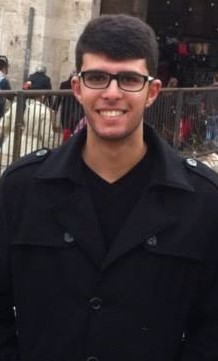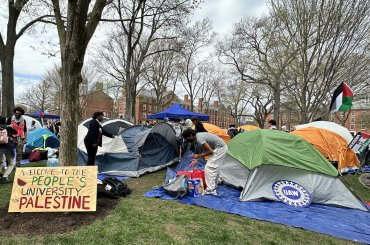https://vimeo.com/133433599
Katie Comfort talks with Yazan Meqbil on the impact he hopes the documentary Detaining Dreams will have for audiences in the United States and the West Bank. Meqbil grew up in the village of Beit Ummar, located between Bethlehem and Al Khalil, and assisted in making the documentary. He is currently a college student in Indianapolis.
Yazan, why don’t you tell me a bit about yourself?
I have lived in the United States for five months. Before that, I graduated in 2014 and took a gap year to do documentaries. I had several projects going at once; one was about my grandparents’ experience in the 1948 catastrophe, and their experience in refugee camps near Hebron. My purpose in telling their story was to record the history of what happened in 1948 for future generations.
I also worked on some documentaries with organizations, such as Detaining Dreams.
Can you talk some more about your experience working on Detaining Dreams?
Yeah, I helped with the interviewing and the translation of the interviews. It was hard for me, because I knew all four of the boys being interviewed. And this experience was a reminder of what they, and so many others, have been through. For example, my father was arrested during the Intifada, and these interviews reminded me of his experiences with fear. It was hard to translate in the midst of that.
What do you hope Detaining Dreams will accomplish?
Well, documenting the events that have occurred is important and useful. I like the documentary format because it is new and easily accessible, and it’s an essential tool for reframing the Palestinian situation, and gives an alternative to the media that is shown all over the world while creating understanding for viewers. This documentary was also important because it gave the boys a way to tell their story.

How do you think Detaining Dreams will be received in the West Bank?
I think it will have a positive influence in the West Bank. Because the four boys are students, I think it can be used for education. The documentary could be shown in schools to help classmates understand what boys who are arrested go through, for example.
Showing the documentary in The West Bank also creates community understanding of the traumas that these kids, and countless others, have gone through. The experiences of military detention are personal to Palestinians, because most men in our community have been arrested. Creating understanding means that there is better support for them when they get out, especially since many of them change.
What changes occur when the children and men are released from detention?
Well, like one of the boys in the film for example, before he was arrested he was top of his class, super happy. And then since he was released he rarely goes to school. He quit the science track of high school and might not graduate. There is a definite change in personality. And this is common, I have seen a lot of my classmates get released from detention and then have no hope. No hope for the future. They are only focused on the present moment. They have a hard time trusting anyone. Arrests destroy the community and create loss.
So creating support is really important.
Yeah, arrest becomes a part of their childhood, so support is critical. During the filming of Detaining Dreams, there was a lot of familial support for the boys while filming was happening. Most of them have one or two family members in the shot with them, but there was a large community there to support them as well. This was important, too, because a lot of the family present had been arrested before.
How did your familiarity with these boys impact the filming experience?
I knew many of them before, or I knew their families. And I think that because I was there, it was safer for them to share. It allowed them to react and respond to what they had been through during detention. And it provided an outlet. This is something powerful about documentaries as well, they tell the stories in ways which can be releasing, and they show how experiences can be the same and different.
Thank you, Yazan, for your time. I’m looking forward to the Chicago premiere of Detaining Dreams in November!
Me as well, thank you.
For more information about Detaining Dreams and the “No Way to Treat a Child” campaign, email us: detainingdreams@gmail.com



The article mentions a Chicago premiere in November. When and where?
ANOTHER WORTHWHILE ENDEAVOR: Palestine’s Intifada: the Process of Liberation is Irresistible | by Vijay Prashad | Counterpunch | October 19, 2015
SOURCE – http://www.counterpunch.org/2015/10/19/palestines-intifada-the-process-of-liberation-is-irresistible/
I always say that if by relentless injustice someone forces another to defend himself with some form of aggression than the former has condemned himself, but if with injustice he forces a child who dreams of something better to the depths of such despair then forgive me if I must revert to the following adapted to the context here:
And everyone who commits an offense against one of these little ones who believe in me [in this case who dream], it were profitable for him that a donkey’s millstone would be hung around his neck and he be sunk in the depths of the sea.
So when Zionists state that the Palestinians want to drive them into the sea; this is false, because in actual fact Zionists condemn themselves to a fate of their own making with the injustice they inflict especially on these children.
Thank you Katie for the great interview, and Yazan the trailer is incredible, the faces you have chosen to show us; and the two last speakers are very powerful in the context of the boys’ faces… Best of luck getting out this very important story
I just got back from seeing this documentary in Chicago. The issue is not particularly new to me–when I was a college student and first becoming aware of Palestinian history, I heard a fellow student speak about his detention by Israel when he was a kid. They mistreated him, including sexual abuse. That was in 1984. So it has been going on for a very long time.
Although I already knew about the issue, still, this film has had an impact on me. Watching the boys’ faces as they speak about how they were mistreated was very emotional. My own son is Palestinian, so it could be him. The thought of it fills me with grief. Teenage boys are not as tough as they try to act. They are very tender, very soft inside; emotionally and psychologically they are still children. What Israel does to them is extremely cruel and heartless. It’s child abuse, torture of children. And the families suffer unbelievably having their child taken away.
I hope the Israeli mistreatment of children gets a lot of public exposure.